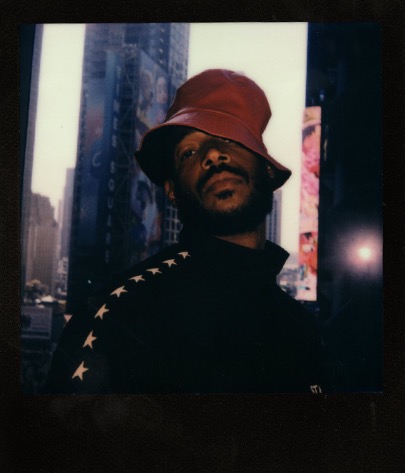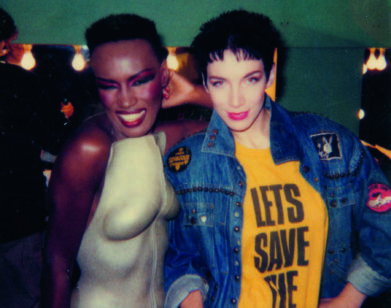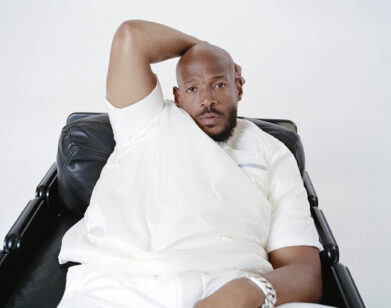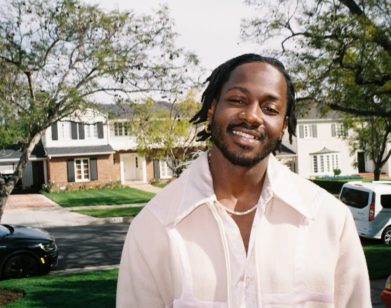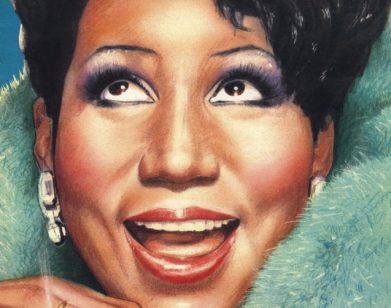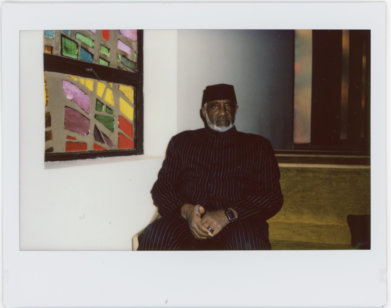IN CONVERSATION
Marlon Wayans and Kerry Washington Plan Their On-Screen Reunion
Marlon Wayans has had a busy year. Last month, the Aretha Franklin biopic Respect was released, where he plays Ted White, the infamous ex-husband of The Queen of Soul. The dramatic role is a departure for Wayans, who has made a name for himself in the comedic world as an actor, stand-up comedian, writer, and producer over the course of his three-decades-long career. As a member of one of the most famous (and funny) families in show business, Wayans never strays far from his humorous roots. His second comedy special, HBO Max’s “You Know What It Is,” is a return to form—with Wayans cracking jokes about everything from outie bellybuttons to the many tribulations of fatherhood. In honor of both releases, Wayans hopped on Zoom with his former Little Man co-star Kerry Washington to discuss his recent pivot to drama, plans for an on-screen reunion, and why he’s finally ready to be a leading man. – JULIANA UKIOMOGBE
———
KERRY WASHINGTON: Hello?
MARLON WAYANS: What’s up, baby? How are you doing?
WASHINGTON: I’m so happy to do this with you.
WAYANS: I called upon your services.
WASHINGTON: I appreciate the ask. You’re brilliant in Respect.
WAYANS: Thank you. I’m alright. You’re just happy to see me.
WASHINGTON: I am happy to see you. This morning, I was thinking about my earliest Marlon Wayans memory. I was way too young to be at Soul Kitchen in New York. You were at LaGuardia, and we were talking. You mentioned your brothers and how you were going to L.A. I was like, “They’re just going to get bigger and bigger. They’re gonna be huge.” Then when I got to do Little Man with you guys, I was so excited.
WAYANS: You were, but then you were like, “Wait a second. I don’t actually get to work with you? All this talk about working together, and I’m not working with you in any scenes. I’m just with this little guy and your brother?”
WASHINGTON: [Laughs] And I’m still waiting to work with you. Ok, so did it feel good to step into a more dramatic role?
WAYANS: After the work of doing comedies, absolutely. Because as a comedian, all I do is take things that hurt me and go, “What’s funny about that?” And then I give it back to the world. That’s my life. People smiling makes me smile, but I don’t actually deal with the pain.
WASHINGTON: When the pain happens, do you give yourself time to experience it, or are you rushing to create content immediately?
WAYANS: Rushing to create content. The quicker I deflect it, the happier I’m going to be. I feel the sadness and I feel the gloom, and I feel it starting to beat me down mentally emotionally, spiritually and I go, “Okay this isn’t you. This is not how you’re wired. So, what are we going to do to fix what you’re feeling?” From that point on, I take the emotion and I store it somewhere deep within myself. I put it in a safe and then I deal with it later. I’m solution-oriented. So I go, “How do I fix the problem? How do I fix everybody else? I’ll get to me later.” When you do a drama, you have to tap in.
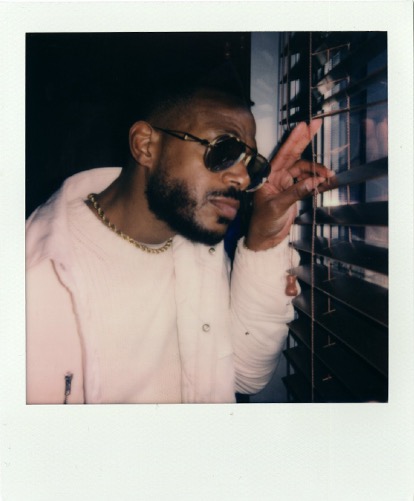
Sweater, Jacket, and Pants by Helmut Lang. Sunglasses by SpiltMilk Eyewear. Necklace by Erickson Beamon. Watch by Rolex.
WASHINGTON: You have to go back in that safe. When you were working on Respect, did you have help or did you rely on your own craft? To me, when you don’t open up that safe for a while, it can be scary.
WAYANS: It’s the scariest thing ever. You have to trust your director, which I did with Liesl [Tommy]. She created such a safe space and such a trust. When you ask about teams, I had a movement coach, a voice coach, and an acting coach. I worked with them all week long so that when I came to set, the clay was ready for Liesl to do what she needed to do. Then if I started crying, she’d be like, “Negro, are you ok?”
WASHINGTON: “Can you pull it together?”
WAYANS: “Not yet. I just need another minute.” But, it was dope to feel that because when you’re honest on set and you walk away and go home, you know you’re doing good work and that’s all I care about. All I can control is every frame of truth for the character that I allow myself to experience.
WASHINGTON: What was really fun to watch was the emotional truth that you’re describing, and at the same time it’s layered in this beautiful character work. You are so specific. I love hearing that you worked with a voice coach because I was like, “What is this old Hollywood sound?” It was this His Girl Friday, Cary Grant, old Hollywood romance thing that was so perfect because it pulled us in. I felt like I was watching you and Jennifer [Hudson] do your own version of Mahogany, and then it went dark.
WAYANS: [Laughs] Then it turned into What’s Love Got to Do with It. But, all of us worked with the same coach because all of us wanted to be in the same movie. I only had two minutes of footage and that’s what I had to study. I noticed that Black men of that era always wanted to sound articulate. So, they had to gather their words before they said them. This is when brothers really started reading and dressing. With the way he spoke, he was worried about the perception that people would have of him and he didn’t want to look ignorant.
WASHINGTON: Were you able to spend time with him?
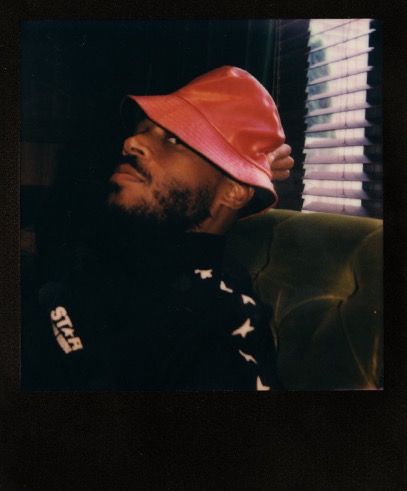
Hat by Fiorucci. Track Jacket by Golden Goose.
WAYANS: No, but he doesn’t want you to know about his checkered past. He was a “gentleman of leisure.” But for me, I wanted to honor their love, no matter how toxic it was. This woman wouldn’t be with this man if she didn’t love him, so you needed to see them fall in love and it had to be genuine.
WASHINGTON: You made him so vulnerable.
WAYANS: Because he’s not a monster. What would make a man beat a woman that he loved? Damaged people damage people. So, he got to a point where he lost control. The only thing he could grab hold of was what he knew from his pimping. But then you do that a couple of times and then a powerful woman like Aretha has to make a very hard choice in her life, and that’s to leave you. Inside this monster is a really hurt little boy.
WASHINGTON: I was so happy that she left you, but I was so sad to not have you in the movie anymore. I was like, “Wait. I’m not ready for them to be done. I need more Marlon.”
WAYANS: [Laughs] Black women hit me in the street and say “I’m mad at you because you made me like you, then you made me hate you, then I felt bad for you.”
WASHINGTON: And you’re like, “But that’s the journey. You’re welcome.” I really thought the electricity between you and Jennifer was fantastic. It was so generous and you were both really open to each other.
WAYANS: It all comes down to trust, right? You have to create comfort. What we’re doing is making make-believe believable. When they say “cut,” she’s Jennifer and I’m Marlon, but in the moment from action to cut, we have to be true. It’s also about the relationship that she and I have. I’m a really nice co-star to work with. If Jen needed something to eat, I’d get her some shrimp fried rice. If I saw she worked extra hard, I’d send her to the spa. Sometimes when I would do stuff, I would say “Love, Ted.” We had comfort in terms of our characters and in our relationship. So, when it’s on-screen, it’s pure.
WASHINGTON: Your hearts were on the line.
WAYANS: When we were doing the abuse scenes, she was like, “Marlon, you’re gonna have to hit me harder than that. I’m from Chicago.” She was in that space, and I was like, “Alright, bet. Let’s go.”
WASHINGTON: I love that she felt the freedom to be transparent with you and that she could trust that you wouldn’t cross the line. You would go to the line, but not cross it. That’s huge. We’ve all had those moments on set where you’re like, “Whoa, whoa, whoa.” And everyone’s line is different, too. That’s why you have to talk about it. When I was a producer on Little Fires Everywhere, when I had to do a love scene, I had to be like, “I know I’m the producer, but if you’re uncomfortable, you gotta let me know.”
WAYANS: I’ve been producing since I was nineteen years old. I’ve always been set-aware. I absolutely love my co-stars and they’re like my sisters. That’s why I like working with some of the same people. They’re my friends. The love is real.
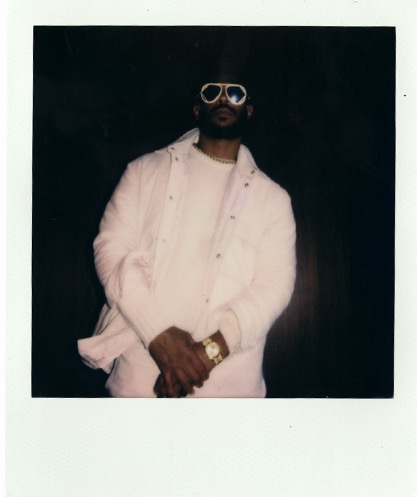
Sweater, Jacket, and Pants by Helmut Lang. Sunglasses by SpiltMilk Eyewear. Necklace by Erickson Beamon. Watch by Rolex.
WASHINGTON: You know, doing Little Man with you guys had a huge impact on me. That set was so filled with respect, joy, and we went home on time. There was no ego. I remember your brother saying to me, “There is no vanity in comedy.” For you, I really see that being woven into your career. There’s no vanity in the work, period. You’re really showing up to give what each project needs. At this moment, to see the comedy special and Respect, you see how you’re able to bring excellence in two completely different mediums. They couldn’t be more different, except that your commitment is to truth in both spaces. I really see you fighting for truth in the work, whether it’s to make people laugh or to make people reflect and cry.
WAYANS: As an actor now, I’m seasoned. I’ve grown into my face. I can grow a beard. I have muscle. I looked like a kid for the longest time. So I’m ready for the leading man because now I can do charm without being over the top. I now have enough skill to where I can be appropriate in any moment. It’s a science. I’m a very complex dude. I don’t just act and I just don’t do drama. I do comedy, stand-up, produce, write. I’ve done so much and now my dramatic acting and comedic acting have caught up to each other. I started stand-up 10 years ago. It’s still in its infancy stage. This is only my second special.
WASHINGTON: That alone must be so intimidating coming from the family that you come from.
WAYANS: That’s one level of intimidation. You have to understand, by the time I started doing stand-up, I was already famous. So I’m coming in to coffee shops and to dive bars. I didn’t say, “Yo, I’m Marlon Wayans, I’m going up.” No, I went back like a journeyman. For the first special, I did 80% about the state of the world and 20% me. In this one, I did 100% me. I’m learning and it’s so dope. When my tenure as an actor meets my tenure as a stand-up comedian, it’s gonna blossom in a beautiful way.
WASHINGTON: Ugh, I can’t wait to work with you. What I want to see you do next, not that you asked me, is something that brings in a little bit of all of the elements where you can be all of Marlon in one space. A little bit of funny Marlon, a little drama, some action.
WAYANS: I agree. That’s what I’m looking for.
WASHINGTON: Let’s talk about the special. You talk about mistakes. Do you think that that has something to do with you being ready to be more vulnerable?
WAYANS: I’m definitely much more vulnerable because I’ve learned my own rhythm. With my stand-up, in the first five minutes I go on a crazy riff that really has nothing to do with anything, but as you unravel the onion, then you get to the heart. I get deeper as the special goes on. It becomes less about the funny and more about the truth.
WASHINGTON: The crazy stuff in the beginning got me out of my comfort zone. You disoriented me a little bit so that I would get in this car with you and be on this journey with you through your life.
WAYANS: That’s what I do. The longer you know me, the better I become. I’m just one of those people. Because you get the silly and then you’re like, “Wait a second. There’s a person here with some intellect. Oh wait, that man feels something.” I’m at a place where god broke me. I lost my mom.
WASHINGTON: I’m so sorry, Marlon.
WAYANS: It’s ok, she’s with me. But I got crying to do. I got pain. I’m at a place in my life where I’ve been broken and I’m putting pieces of myself back together. I can be vulnerable because I am.
WASHINGTON: Because it’s your truth.
WAYANS: Right. That’s why I want to do more drama and more gritty stuff. For my next stand-up, I talk about my mom’s death and what’s funny about it.
WASHINGTON: Are you already on the road working on it?
WAYANS: I got a brand-new hour and a half. I’ve done maybe 20-something shows with my new act.
WASHINGTON: How did you perform during COVID? Where did you go during lockdown?
WAYANS: Girl, Florida and Texas was always open. They don’t give a fuck. They’re like, “Yeah, yeah, yeah. COVID my ass.”
WASHINGTON: [Laughs] Oh, yeah. What do your ex or your kids think about the show? Do you preview the material with them? Do you let them know that you’re writing it beforehand?
WAYANS: I go, “Yo, I’m doing this special and here’s the content.” They cracked up. My daughter gave me a thumbs up. They know I love them. I’m just blazing a trail for them to express themselves and to be themselves. It’s like, “I’ll never do anything to hurt you, but ya’ll be doing stupid shit sometimes.”
WASHINGTON: “And I’m gonna talk about it.”
WAYANS: “You like USC? You like that house you living in? Then let me pay these fucking bills.”
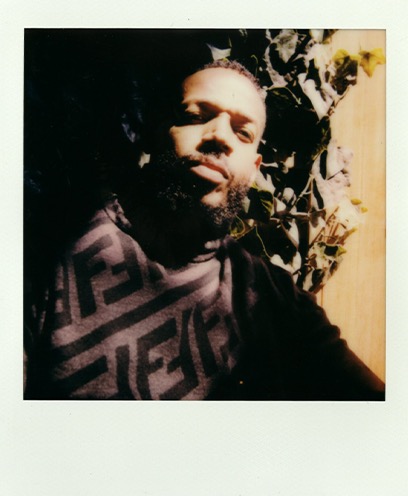
Sweater by Fendi. Pants by Helmut Lang.
WASHINGTON: [Laughs] It comes with a price. I love that.
WAYANS: How good would we look in a movie together? Look at these faces.
WASHINGTON: Look at these cheekbones. We could be brother and sister or husband and wife.
WAYANS: All of the above. We’re gonna do a movie called Make It Weird. You’re going to play my wife, then you’re gonna find out that you’re my sister. And that’s how we get divorced.
WASHINGTON: Oh, god. That’s a tragedy. Also, in Respect, it was really fun to watch you surrounded by all these Oscar winners like Jennifer and Forest [Whitaker] and to put your flag in the ground and hold your own. It really made me so happy for you.
WAYANS: It made me happy. I wasn’t thinking about that walking in because then I’d be intimidated. Working with Forest, he’s such a G.
WASHINGTON: I love him so much.
WAYANS: He’s so prepared. He comes in there and throws his weight.
WASHINGTON: I always say that Forest doesn’t just know his character’s life, he knows his character’s past three lives.
WAYANS: He do the work, work, work. But we battled intentions and that was so nice about our scenes. We were each other’s obstacles. We had contrasting objectives. His would be to scare me, and mine would be not to back down. We didn’t even have to say it with dialogue, it was in our stares. When we’d finish a scene, he’d give me a pat and say, “That was beautiful work,” and walk away. That would be my release, then I would go cry. When you get that from a GOAT, you feel good.
WASHINGTON: Deserved.
WAYANS: I also just want to say that I’m so proud of you.
WASHINGTON: Don’t make me cry, Marlon.
WAYANS: When you did Little Man, I was always telling you, “Kerry, you need to produce. You need to create stuff for yourself.” And guess what? You’re doing it.
WASHINGTON: I’m telling you, working with you guys changed my life. I tell the story all the time because you made me audition like 20,000 times.
WAYANS: You said you wanted to do comedy.
WASHINGTON: They said, “Kerry Washington’s not funny.” And I said, “I’ll come be funny.” I love that you guys wanted to make sure it wasn’t a fluke. When you gave me the advice to create my own material, I really heard it because I watched the world that you all created together for each other. I was like, “I have to take my destiny in my hands. I can’t just wait at home for someone to invite me to the party.” You guys taught me that you have to throw your own party and take responsibility for your party. I learned so much about what this business could be and how to create a life for yourself in it. I’m so grateful.
WAYANS: One day we’ll do something together. You said you’re throwing your own party and right now, you’re doing it. I’m proud of you, baby. I love you.
WASHINGTON: I love you, too. Thank you for asking me to do this. I’m honored and delighted.
———

